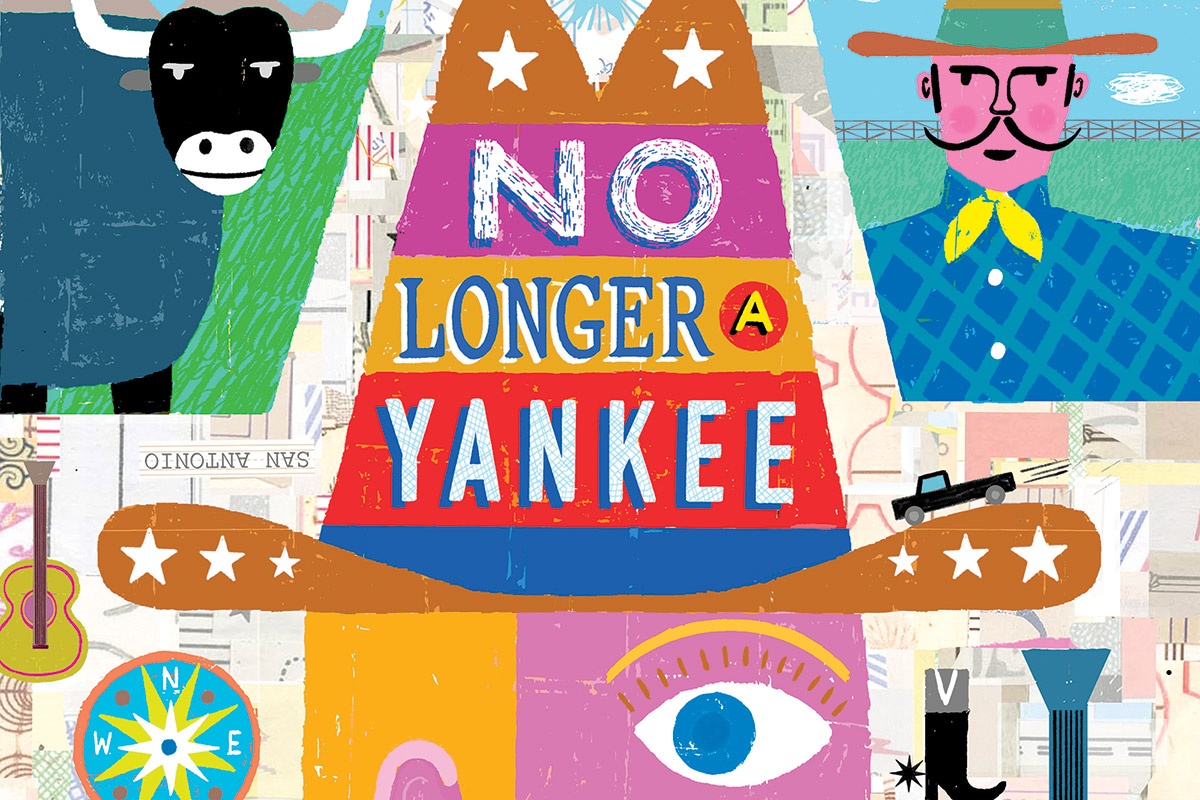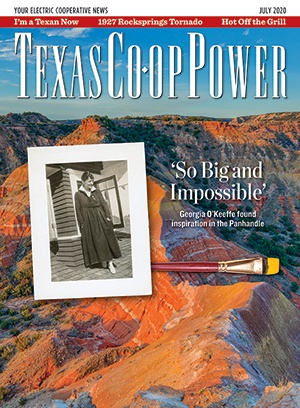I was born in Michigan but moved to Texas 50 years ago. I’m 56 now, which means I’ve spent 90% of my life as a resident of the Lone Star State. Until recently, I have not thought of myself as a Texan. I came from “up north.”
In Ann Arbor, my family ate dinner, not supper. We sipped pop, not soda. We nibbled PEE-cons instead of pe-CONS—and never baked them into pies. And we never, ever blessed anybody’s heart.
We moved to Texas in 1969, when my dad, an aeronautical engineer, transferred to Austin. In my 5-year-old mind’s eye, I was moving to the land of tumbleweeds where people rode horses, wore cowboy hats and lived in a forest of prickly cactus. All that sounded exciting, but when I moved into a tract house in an Austin neighborhood, I still had to walk to school, and not once did I see a tumbleweed.
I’ve spent most of the past five decades thinking of myself as a misplaced Midwesterner. Texans are big, bold and, I used to think, a tad obnoxious when it came to state pride. Now I’ve changed my mind.
Texans are a proud lot, always noting how many generations of their family have lived on Texas soil. A few years back, a blog from The New York Times published a report noting population trends across the United States. The article said 61% of the people who lived in Texas in 2014 were born here, the highest retention rate of any state. That percentage had dropped just six points since 1900, when 67% of the state’s residents were born within its borders.
I asked some of my most Texan friends their opinions about my Texanness, noting that I’d been living on Texas soil for half a century. Steven Fulton, a 39-year-old native and ranch manager of Selah Bamberger Ranch Preserve near Johnson City, was skeptical. “I don’t know. There’s a lot of development that happens in those first five years,” he said. “Are you driving a truck yet?”
My personal vehicle is a bicycle, with a Fiat Spyder convertible as backup, but my husband drives a Ford F-150. And while out adventuring in his truck, I’ve taken a baseball-sized rock through the windshield and collided with a white-tailed deer, which all seem pretty Texan.
Next I phoned West Hansen, a 57-year-old fourth-generation Texan born in Pasadena. One of his great-grandfathers is buried in the Texas State Cemetery; another was the Dutch consul to Texas. Hansen stops for ribs on his weekly commute from Austin to Port Arthur and paddles rivers with a group of guys called the Cowboys.
When I asked him if I had to be born on Texas soil to qualify as Texan, he pointed out that if that was true, Stephen F. Austin, the Father of Texas, couldn’t claim Texas heritage. Austin was born in Virginia, spent just 15 years in Texas before dying of pneumonia in 1836 and still has a city named for him plus a 76-foot statue of himself outside Angleton.
“It’s kind of like what it takes to be an Australian,” Hansen went on, fleshing out his only-a-true-Texan-would-think-of-it reasoning. “There’s a certain attitude that has to do with being the ultimate C student. We’re probably not welcome in most polite atmospheres, and we have no qualms about that. We tend to make our own way where it’s needed.”
So, I’m not native, but I’ve been here longer than someone half my age who was born over Texas caliche. I’m more Texan than them, aren’t I?
Hansen, probably wiping a dollop of cream gravy off a chicken-fried steak from the other end of the phone line, hesitated. “You don’t sound like one—you have a distinct accent,” he said, in a slow drawl. But Texans are brash, bold, independent and paradoxically, he said, rely upon one another. They aren’t concerned with the opinions of people outside their state but do care about their parents’ opinions.
“I’d say you are,” he finally conceded.
Another native Texan, Jason Jones, who lives part-time in Terlingua, assured me I qualify.
“I think it’s more of a state of mind. If you’ve been here for a while and you feel Texan, then you’re Texan,” he said. “It’s kind of a mindset of vastness and diversity.”
I know that March 2 is Texas Independence Day. I like country music—especially James Hand. I’ve attended chicken poop bingo night at a local bar and even buy jars of pickled okra. I’ve petted a longhorn, sat in a field of bluebonnets, held a horned toad, watched the raging power of a flash flood and two-stepped across a creaky, wooden floor in a genuine Hill Country dance hall. I’ve paddled the Pecos and Devils rivers, gone teal hunting with the former head of the Texas Parks and Wildlife Department, and own not just one but two cowboy hats, which I actually wear with regularity. I know how to ride a horse, can load a powerboat onto a trailer and make a mean margarita.
My best friend lives in the country with 15 horses and three dogs (bless her heart). Her boyfriend, a horse trainer with a handlebar mustache, makes chili (no beans) and frijoles a la charra from a 1949 cookbook called A Taste of Texas.
No, I wasn’t born in Texas. I’ll never be a native Texan. But after half a century in this amazing state, I’m officially claiming it as my own.
Pam LeBlanc is a former staff writer at the Austin American-Statesman. She has finally embraced what she calls her “Texanity” and admits a soft spot for chicken-fried steak, cowboy hats and horses.


